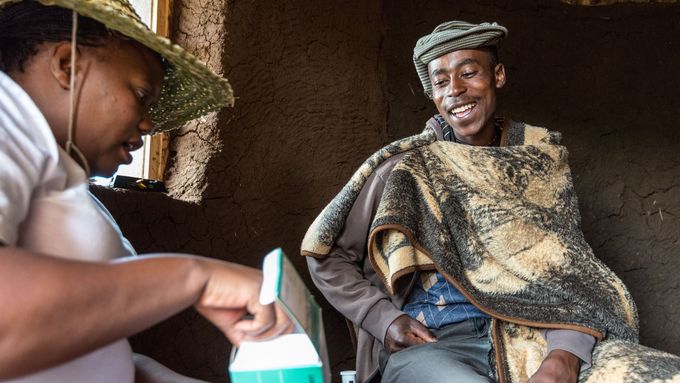New Programme to Tackle Non-Communicable Diseases in Lesotho
08.01.2021
Non-Communicable Diseases (NCDs) such as diabetes and high blood pressure are the number one cause of death and disability globally. More than 75% of premature NCD-related deaths occur in low- and middle-income countries. A new programme coordinated by SolidarMed, Swiss TPH and partners in Lesotho aims to tackle NCDs in Lesotho, building on long-term experience in HIV/AIDS chronic disease care.

The programme will build on experience in HIV/AIDS chronic disease care to tackle NCDs in Lesotho. (Photo: Christian Heuss / SolidarMed)
In many sub-Saharan African countries, including Lesotho, NCDs have overtaken infectious diseases as the major burden of disease. Lesotho has successfully managed to reduce HIV transmission and AIDS-related deaths due to a decentralized HIV testing and care strategy. A key attribute of this strategy was the involvement of community health workers (CHWs) to guarantee access of testing and treatment to the rural population.
Building on this experience and network, a new Swiss Agency for Development and Cooperation (SDC) programme called ComBaCaL (Community Based chronic disease Care Lesotho) aims at improving NCD care through training in prevention, screening, diagnosis and care at both the health centre and community level. The programme will start in two rural districts in Lesotho and focus first on high blood pressure and diabetes. It will then be scaled-up beyond the initial programme area and widen its scope to include mental health disorders.
"There are a lot of publications describing the NCD epidemic in low-resource settings, but there is a clear research gap when it comes to assessing innovative care models that support the scale-up of access to NCD prevention and care. Our aim is to close this gap," said Niklaus Labhardt, Research Group Leader at Swiss TPH and president of SolidarMed. Swiss TPH in collaboration with SolidarMed has successfully validated and implemented several innovative community-based HIV models over the last 5 years in Lesotho.
Innovative eHealth-assisted community-based care
ComBaCAL will train CHWs to provide NCD prevention, screening and diagnosis. "In a large-scale, cluster-randomized trial, we will go even one step further and evaluate if CHWs can effectively and safely deliver care for uncomplicated NCDs in their communities," said Alain Amstutz, physician and PhD student at Swiss TPH. A locally developed eHealth application with smart clinical algorithms will assist CHWs, allow supervision by clinic staff, and efficiently link the data to the health facility.
Social and economic factors
By offering care close to people's homes and empowering CHWs, ComBaCaL also aims to address poverty and social factors, both of which are closely interlinked with NCDs. CHWs - who are mostly women - will be employed by a social enterprise, enabling them to acquire entrepreneurial skills and set up small businesses. "I believe that ComBaCaL will have a transformative impact on NCD care in low- and middle-income countries in an innovative, self-sustainable way," said Ilse van Roy, Head of International Programs at SolidarMed.
About ComBaCaL
ComBaCaL will be led by the Swiss NGO SolidarMed and include Swiss TPH, the National University of Lesotho, the Lesotho Ministry of Health and others. SDC will fund the programme with CHF 6 million over the next five years.
Links
- Press Release SolidarMed
- HIV and Chronic Disease Care at Swiss TPH
- SDC Health
Stay connected
Subscribe to our newsletter and get all the latest research news, project update, course and events listings from Swiss TPH.